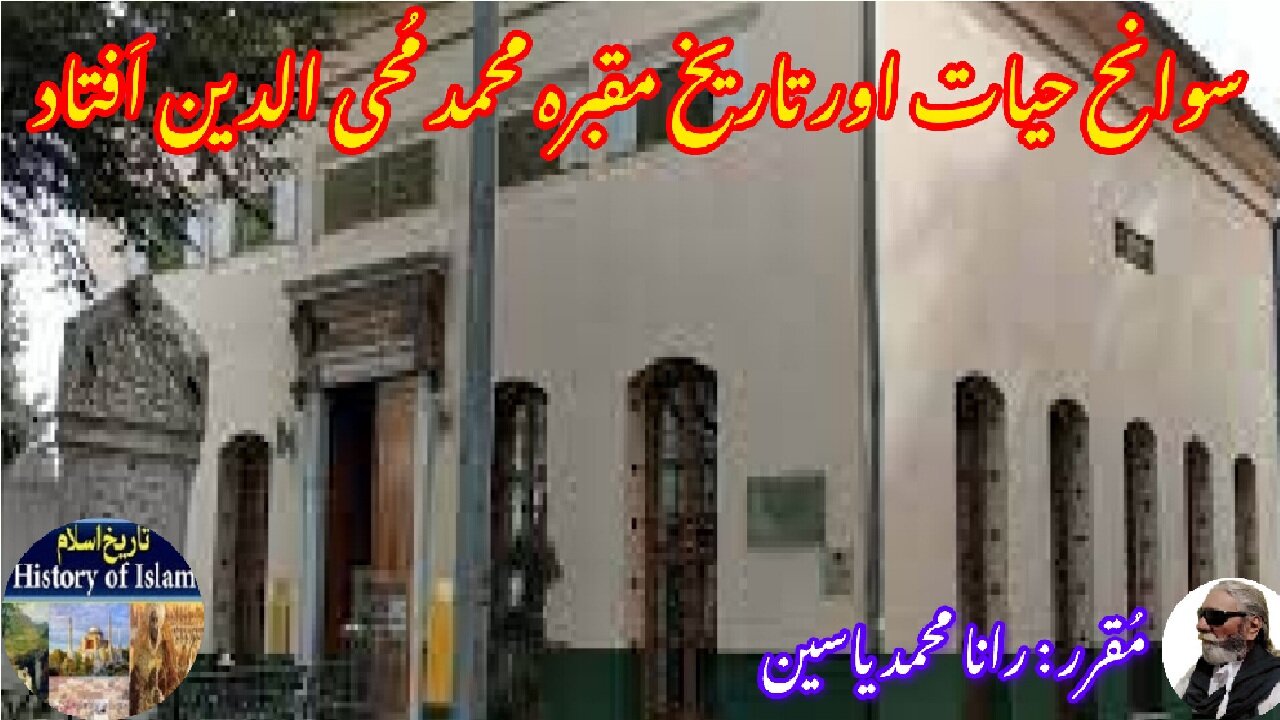Premium Only Content

Mehmed Muhyiddin Uftade and his shrine محمد محی الدین افتاد کی سوانح عمری اور مزار کی تاریخ
@islamichistory813 #sufisaint #cultural #heritage #biography #islamic #mysticism #islamic #philosophy #shrine #historical #figures
Biography of Mehmed Muhyiddin Uftade and the history of his shrine
Dekhti Aankhooon aur sountay kaanoon ko Asslamoalaikum, sisters, brothers friends and elders, in informative series videos of Islamic ascolars, sufisaints, cultural heritages, islamic philosophys, islamic mysticisms and historical figures. today we are describing biography of Mehmed Muhyiddin Uftade and the history of his shrine.
Uftade, also known as Mehmed Muhyiddin Uftade, was a distinguished Ottoman Islamic scholar, Sufi poet, and spiritual master born around 895 AH/1490 AD or possibly 900 AH/1495 AD in the city of Bursa, located in modern-day Turkey. He lived during the golden era of the Ottoman Empire, a time when Islamic thought, mysticism, and culture flourished under imperial patronage. Uftade is widely recognized for his deep spirituality, humility, and guidance in the path of Sufism, particularly within the Jalwatiyya (Celvetiyye) Sufi order. He is best known as the spiritual mentor of the celebrated Sufi saint Aziz Mahmud Hudayi, who carried forward his teachings and spread the influence of the order across the Ottoman lands.
From an early age, Uftade exhibited a strong inclination toward spiritual life and religious learning. He was known for his modest lifestyle and deep devotion to God, choosing a path of asceticism and sincerity rather than worldly recognition. He served as a muezzin at the Bursa Grand Mosque (Ulu Cami) and was involved in various spiritual practices that reflected his inner longing for divine truth. He eventually became a respected teacher and spiritual guide, attracting students and followers who were drawn to his wisdom and piety. Unlike many Sufi masters of his time who accepted worldly donations and gifts, Uftade insisted on earning his living through lawful work. He repaired sandals and sold herbs to sustain himself, emphasizing the importance of self-reliance, humility, and honesty. His refusal to depend on patrons or wealth became a cornerstone of his spiritual philosophy.
Uftade’s teachings emphasized the purification of the heart, remembrance of God (dhikr), and the importance of inner sincerity (ikhlas) in all acts of worship and worldly engagement. His poetry, composed in Turkish rather than the more scholarly Arabic or Persian, reflected his desire to make spiritual knowledge accessible to the common people. His poems are deeply mystical, often exploring themes of divine love, annihilation of the self (fana), and the mysteries of the spiritual journey. He believed that divine knowledge was not merely theoretical but had to be experienced through inner transformation and sincere devotion. His use of simple language made his message resonate deeply with both the scholarly elite and the ordinary believers of the Ottoman Empire.
One of the most important legacies of Uftade is his mentorship of Aziz Mahmud Hudayi, who would go on to become one of the most revered saints in Ottoman history and serve as the spiritual guide to Sultan Ahmed I, the builder of the famous Blue Mosque in Istanbul. Under Uftade’s guidance, Hudayi underwent rigorous spiritual training and later founded the Celvetiyye order, which spread widely across the Ottoman Empire and beyond. This lineage of spiritual transmission ensured that Uftade’s teachings continued to influence generations of Sufis, scholars, and seekers of truth.
Uftade passed away in 988 AH, corresponding to 1580 AD, in the city of Bursa where he had lived, taught, and served the spiritual needs of the community for most of his life. His death marked the end of a life lived in complete devotion to God and the spiritual upliftment of others. His legacy, however, lives on not only through his disciples and poetry but also through the physical and spiritual presence of his shrine.
The shrine of Uftade, known as the **Uftade Complex (Uftade Külliyesi)**, is located in the Uftade neighborhood of Bursa. It is both a spiritual and historical landmark, drawing pilgrims and visitors from all over the Islamic world. The complex includes his tomb (türbe), a mosque, a dervish lodge (tekke), and a small cemetery. This spiritual sanctuary was established shortly after his death, and though the original structures may have undergone restorations over the centuries, the reverence for the site has remained constant.
The construction of Uftade’s shrine and complex was likely initiated by his followers and local patrons in Bursa who wished to honor the memory of their beloved teacher. Over time, Ottoman rulers and wealthy individuals contributed to the upkeep and renovation of the complex, recognizing the immense spiritual legacy left by Uftade. Today, the site continues to serve as a place of prayer, reflection, and remembrance, preserving the spiritual atmosphere that once surrounded the great master himself.
In summary, Mehmed Muhyiddin Uftade was not only a scholar and Sufi poet but a living embodiment of humility, spiritual insight, and selfless service. His life and teachings remain a guiding light for seekers of divine truth, and his tomb in Bursa stands as a sacred testimony to a soul deeply immersed in love for God.
With this, we ask for your permission until tomorrow and pray to Allah Almighty to grant us the ability to act on the Quran and Hadith, Amen
Allah Hafiz
======================
-
 13:31
13:31
ISLAMIC HISTORY
15 hours agoZaynab bint Ali (RA) Defender of Ahl al Bayt زینب بنت علی رضی اللہ عنہا - اہل بیت کی عظیم محافظ
7 -
 8:11
8:11
MattMorseTV
13 hours ago $2.29 earnedTrump's DECLARATION of WAR.
4.76K30 -
 3:44
3:44
GritsGG
11 hours agoUpdate Your Warzone Loadouts w/ These Tips!
106 -
 2:31:01
2:31:01
The Connect: With Johnny Mitchell
14 hours ago $0.59 earned"It's About To Get Worse"- CIA Agent Andrew Bustamante Explains Why It's Time To Leave America
8682 -
 36:28
36:28
TruthStream with Joe and Scott
1 day agoMark Attwood joins TruthStream in Ireland!
4.01K30 -
 2:13:30
2:13:30
Side Scrollers Podcast
1 day agoUK Introduces MANDATORY Digital ID + Dallas ICE Shooting BLAMED on Gaming + More | Side Scrollers
187K49 -
 LIVE
LIVE
Lofi Girl
2 years agoSynthwave Radio 🌌 - beats to chill/game to
378 watching -
 2:26:44
2:26:44
Tundra Tactical
6 hours ago $7.15 earned🎉 Pro-2A Party LIVE! | Zeke Stout Joins The Show With Tacoma Tactical
8.95K -
 2:36:47
2:36:47
BlackDiamondGunsandGear
7 hours agoAFTER HOURS ARMORY / The LEFT are Recruiting / Join the Leftist Gun Club?
3.97K4 -
 16:07
16:07
Ken LaCorte: Elephants in Rooms
12 hours ago $1.32 earnedWhy firefighting got political
6.67K3